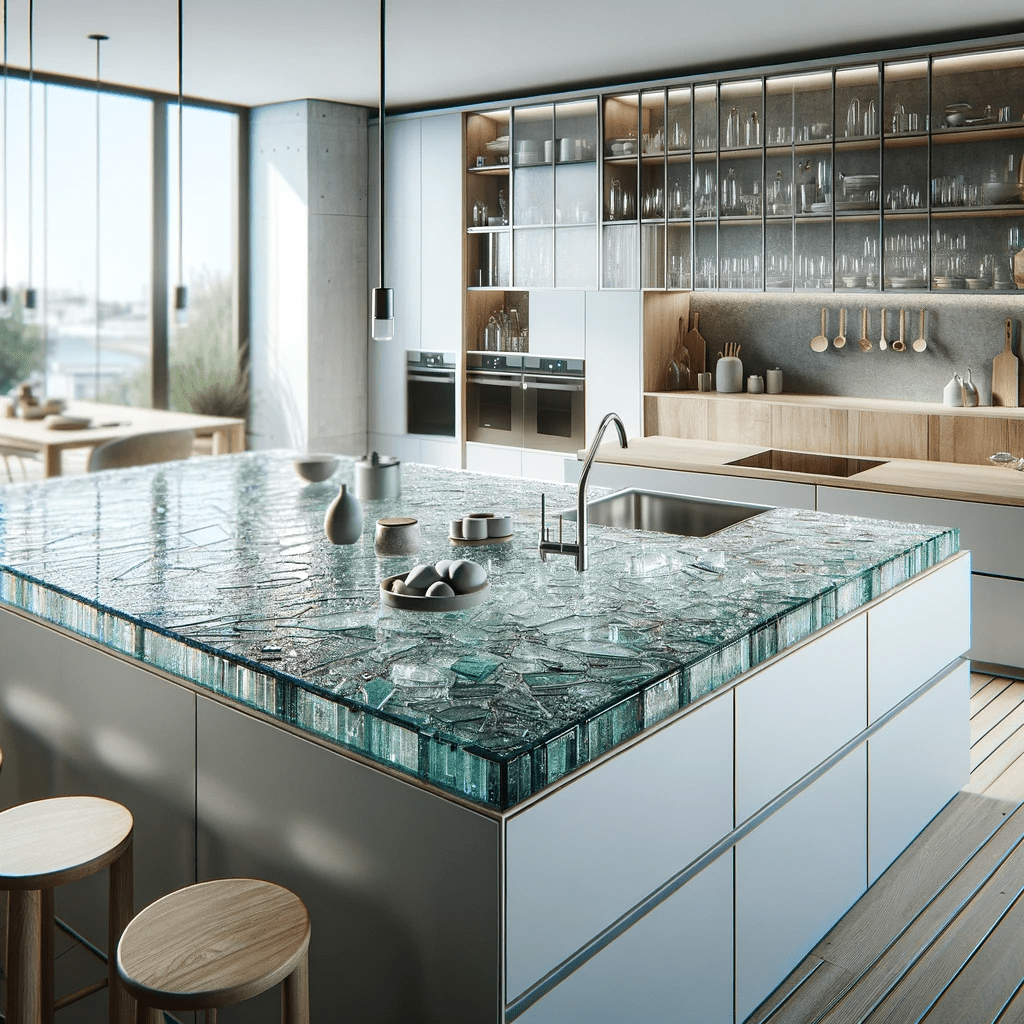There’s a growing trend that’s not only catching the eye of homeowners but also kindling the spirit of environmental stewardship. Recycled glass countertops, with their unique aesthetic and eco-friendly attributes, have become a prominent choice. This comprehensive guide delves into the intricacies of these countertops, exploring their benefits, manufacturing process, design versatility, maintenance, cost, and their role in sustainable living.
1. Recycled Glass Countertops
Recycled glass countertops offer more than just a surface for your daily kitchen activities. They’re a mosaic of sustainability and style. Born from repurposed glass, these countertops are a testament to creative recycling, turning what would be waste into functional art. The process typically involves crushing and combining glass pieces with a binding agent, like cement or resin, resulting in a robust and visually stunning surface.
Understanding the Materials and Process
The journey of these countertops begins with gathering glass, often from sources like discarded bottles and jars. This glass is cleaned, sorted, and then crushed into small pieces. The crushed glass is then mixed with a binding agent. Depending on the desired aesthetic, pigments may be added for color. The mixture is poured into molds and left to cure, creating durable slabs that are then cut and polished for installation.
2. The Environmental Impact
A Sustainable Choice
Opting for recycled glass countertops means making a conscious choice for the environment. By reusing glass, we reduce landfill waste and the energy consumption associated with glass production. The process of manufacturing recycled glass countertops often has a lower carbon footprint compared to traditional countertop materials.
Contribution to Eco-Friendly Homes
Installing these countertops can be a significant step in creating an eco-friendly home. They can contribute to LEED (Leadership in Energy and Environmental Design) points, a globally recognized green building certification system.
3. Design Versatility and Aesthetic Appeal
Recycled glass countertops come in a plethora of colors and patterns. From vibrant hues to subtle earth tones, the glass pieces can be combined in countless ways, offering unique and customizable options for every kitchen style.
Adaptability to Various Design Themes
Whether you’re aiming for a contemporary, minimalist, or rustic kitchen, these countertops can be tailored to fit. The ability of the glass to reflect light adds a luminous quality, making spaces appear brighter and more open.
4. Maintenance and Durability
One of the key considerations for any countertop material is its durability and ease of maintenance. Recycled glass countertops are known for their resilience.
Longevity and Care
These countertops are heat, stain, and scratch-resistant, especially when bound with resin. They don’t require sealing like some natural stone surfaces. Regular cleaning with mild soap and water is typically enough to keep them looking pristine.
5. Cost Analysis and Return on Investment
Initial Investment vs. Long-Term Benefits
The cost of recycled glass countertops is generally comparable to mid-range granite. While the initial investment might be higher than some materials, these countertops can offer longevity and add value to your home, not to mention the intangible benefit of knowing you’ve chosen an environmentally friendly option.
6. Health and Safety Aspects
Recycled glass countertops are not just aesthetically pleasing; they’re also a health-conscious choice. Many homeowners are increasingly concerned about the materials used in their living spaces and their potential impact on indoor air quality.
Non-Toxic and Safe for Home Use
Most recycled glass countertops, particularly those bound with resin, are non-toxic and do not emit harmful VOCs (Volatile Organic Compounds). This is crucial for maintaining a healthy indoor environment, especially in a space as central as the kitchen. Additionally, their non-porous nature inhibits bacterial growth, making them a hygienic option for food preparation areas.
7. Variety of Finishes and Customization
One of the most appealing aspects of recycled glass countertops is the vast range of finishes and customization options available.
Creating Unique Kitchen Spaces
These countertops can be found in a variety of finishes, from glossy to matte, allowing homeowners to choose according to their personal style and kitchen design. The flexibility in the size and color of the glass pieces used in the countertops means that each installation can be unique, reflecting the homeowner’s taste and personality.
8. Installation Process and Considerations
The installation of recycled glass countertops is a critical process that requires precision and expertise.
Professional Installation for Optimal Results
It is generally recommended to have these countertops installed by professionals. The process involves precise measurement, cutting, and handling to ensure the countertops fit perfectly and function optimally. Proper installation is key to maximizing the longevity and appearance of the countertops.
9. Impact on Property Value and Market Appeal
A Wise Investment in Home Improvement
While the initial cost of recycled glass countertops can be higher than some traditional materials, they can significantly enhance the value and appeal of a property. These countertops are often seen as a luxurious upgrade, appealing to potential homebuyers who value both style and sustainability. This can make them a wise investment for those looking to increase their home’s market value.
10. Sustainable Interior Design and Broader Trends
Recycled glass countertops fit seamlessly into the larger trend of sustainable interior design, which focuses on reducing environmental impact without compromising on style.
Part of a Bigger Movement
Choosing recycled glass is a statement that aligns with broader trends towards eco-friendly, sustainable living. This choice reflects a growing awareness and responsibility towards environmental issues, making it not just a design decision but a moral and ethical one as well.
Conclusion
Recycled glass countertops are more than just a trend; they’re a statement of environmental responsibility, artistic taste, and practical functionality. As we move towards more sustainable living, embracing materials that are not only beautiful but also beneficial for our planet becomes increasingly important.
In the next sections, we will explore specific aspects of recycled glass countertops, including their influence on health and safety, the variety of finishes available, the installation process, and the potential impact on property value. We’ll also discuss how these countertops fit into the broader context of sustainable interior design and offer practical advice for those considering making the switch to recycled glass. Recycled glass countertops are more than a mere surface in your kitchen; they are a testament to the possibilities of sustainable design. By choosing these countertops, homeowners can enjoy a unique, stylish, and eco-friendly kitchen while contributing to a healthier planet. The combination of aesthetic appeal, environmental benefits, and long-term durability makes recycled glass countertops a compelling choice for anyone looking to renovate their kitchen with an eye towards the future.
FAQs about Recycled Glass Countertops
What is the average lifespan of recycled glass countertops?
Recycled glass countertops, when properly installed and maintained, can last for over 20 years. Their durability largely depends on the quality of the binder used (cement or resin) and the level of care they receive.
Can recycled glass countertops withstand high temperatures?
Yes, these countertops are generally heat resistant, but it’s still advisable to use a trivet or pad for extremely hot items to prevent any risk of thermal shock.
Are recycled glass countertops prone to scratching or chipping?
They are relatively scratch-resistant, but like any countertop material, they can chip or scratch if subjected to sharp or heavy impacts. Using cutting boards and being careful with heavy cookware can help avoid damage.
How do recycled glass countertops impact indoor air quality?
Most recycled glass countertops are non-toxic and emit no harmful VOCs, thus having a minimal impact on indoor air quality. This makes them a safe option for homes.
How do you clean and maintain recycled glass countertops?
Cleaning is simple: a mix of mild soap and water is effective. Avoid harsh chemicals and abrasive sponges. Regular cleaning and immediate wiping of spills can maintain their appearance and durability.
Are there any limitations in the design or color options?
The range of colors and designs is vast, thanks to the variety of glass used. Customization options are plentiful, but some very specific color requests may be harder to fulfill.
How eco-friendly are recycled glass countertops?
They are highly eco-friendly as they repurpose glass that would otherwise end up in landfills. Their manufacturing process is also generally more energy-efficient compared to traditional countertop materials.
Can recycled glass countertops be repaired if damaged?
Minor chips and scratches can often be repaired, but the feasibility of repair depends on the extent of the damage and the specific type of recycled glass countertop.
What should I consider before choosing recycled glass countertops?
Consider factors like your kitchen’s design theme, the overall budget, and your lifestyle needs. It’s also important to think about the long-term care and maintenance of the countertops.
Are recycled glass countertops suitable for outdoor kitchens?
While they can be used outdoors, it’s important to choose types specifically designed for outdoor use as they are more resistant to UV light and weather conditions.


